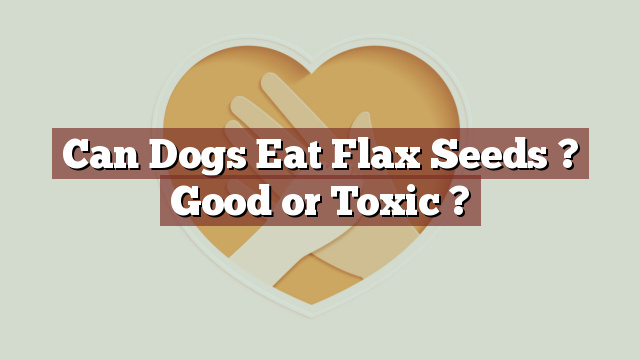Can Dogs Eat Flax Seeds? Good or Toxic?
Knowing what foods are safe for our pets is crucial for their overall health and well-being. As dog owners, we often wonder if certain foods from our own diets can be shared with our furry friends. Flax seeds, known for their numerous health benefits in humans, are a popular choice among health-conscious individuals. But can dogs safely consume flax seeds? Let’s delve into the topic and explore the nutritional value, safety, and potential risks or benefits of feeding flax seeds to dogs.
Nutritional Value of Flax Seeds: A Breakdown of Essential Nutrients
Flax seeds are tiny powerhouses of nutrition, packed with essential nutrients that offer several health benefits. These seeds are a rich source of omega-3 fatty acids, which aid in promoting a healthy coat, reducing inflammation, and supporting brain function. Flax seeds also contain high levels of fiber, protein, and lignans, which have antioxidant properties.
Can Dogs Eat Flax Seeds? Exploring Safety and Toxicity
Can dogs eat flax seeds? The answer is yes. Flax seeds are safe for dogs to consume in moderation. However, it is important to note that whole flax seeds may pass through a dog’s digestive system undigested. To fully benefit from the nutrients, it is advisable to grind the flax seeds before feeding them to your dog. This will ensure better absorption of the omega-3 fatty acids and other essential nutrients.
Potential Risks or Benefits: What You Need to Know About Feeding Flax Seeds to Dogs
Feeding flax seeds to your furry companion can provide several health benefits. The omega-3 fatty acids present in flax seeds can improve skin and coat health, reduce inflammation associated with allergies or arthritis, and support overall cardiovascular health. Additionally, the fiber content in flax seeds can aid in digestion and promote a healthy bowel movement.
However, it is important to keep in mind that flax seeds should be given in moderation. Excessive consumption of flax seeds may cause gastrointestinal upset, such as diarrhea or vomiting. Additionally, some dogs may have an allergic reaction to flax seeds. Therefore, it is always advisable to introduce new foods gradually and monitor your dog for any adverse reactions.
My Dog Ate Flax Seeds, Now What? Steps to Take and Warning Signs to Look For
If your dog accidentally consumes a small amount of flax seeds, there is likely no cause for concern. However, if your dog ingests a large quantity or exhibits any unusual symptoms, it is important to seek veterinary advice. Signs of potential digestive issues include vomiting, diarrhea, or abdominal discomfort. Allergic reactions may manifest as skin rashes, itching, or difficulty breathing. In such cases, it is best to consult a veterinarian for proper guidance and medical attention.
Conclusion: Balancing the Pros and Cons of Including Flax Seeds in Your Dog’s Diet
In conclusion, flax seeds can be a nutritious addition to your dog’s diet when given in moderation. The omega-3 fatty acids, fiber, and other essential nutrients present in flax seeds offer several health benefits for dogs. However, it is important to grind the flax seeds before feeding them to ensure optimal absorption. Additionally, monitoring your dog for any potential allergic reactions or digestive issues is crucial. As with any dietary change, it is always best to consult your veterinarian for personalized advice tailored to your dog’s specific needs.
Thank you for investing your time in exploring [page_title] on Can-Eat.org. Our goal is to provide readers like you with thorough and reliable information about various dietary topics. Each article, including [page_title], stems from diligent research and a passion for understanding the nuances of our food choices. We believe that knowledge is a vital step towards making informed and healthy decisions. However, while "[page_title]" sheds light on its specific topic, it's crucial to remember that everyone's body reacts differently to foods and dietary changes. What might be beneficial for one person could have different effects on another. Before you consider integrating suggestions or insights from "[page_title]" into your diet, it's always wise to consult with a nutritionist or healthcare professional. Their specialized knowledge ensures that you're making choices best suited to your individual health needs. As you navigate [page_title], be mindful of potential allergies, intolerances, or unique dietary requirements you may have. No singular article can capture the vast diversity of human health, and individualized guidance is invaluable. The content provided in [page_title] serves as a general guide. It is not, by any means, a substitute for personalized medical or nutritional advice. Your health should always be the top priority, and professional guidance is the best path forward. In your journey towards a balanced and nutritious lifestyle, we hope that [page_title] serves as a helpful stepping stone. Remember, informed decisions lead to healthier outcomes. Thank you for trusting Can-Eat.org. Continue exploring, learning, and prioritizing your health. Cheers to a well-informed and healthier future!

